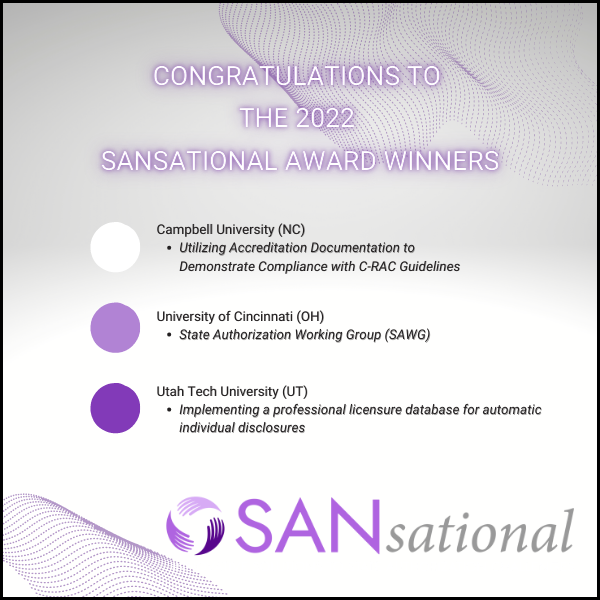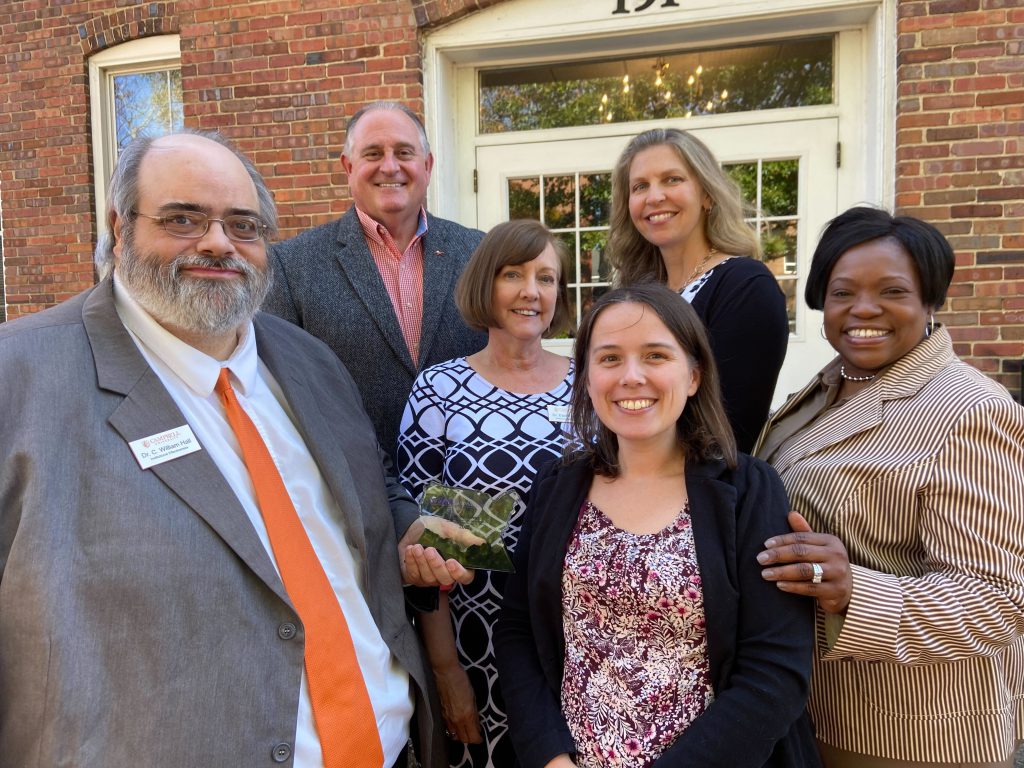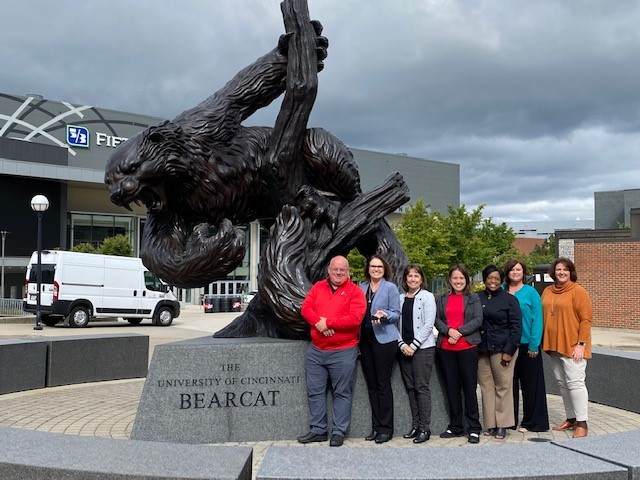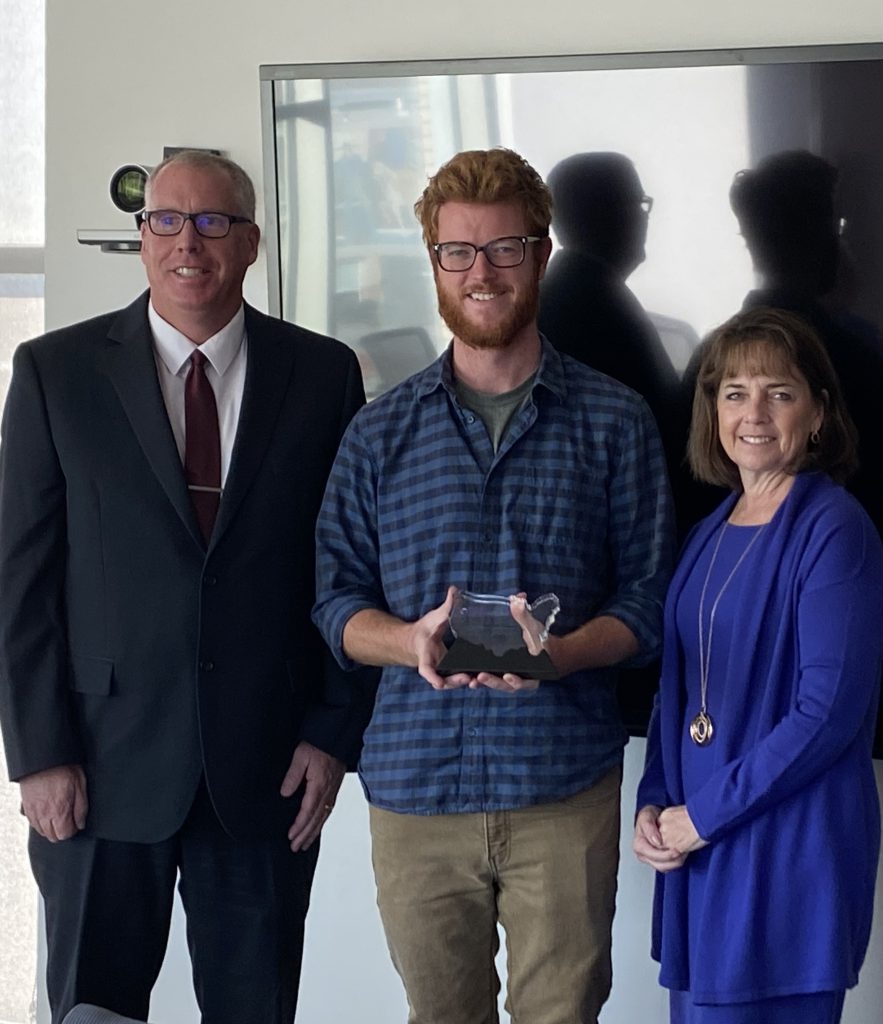2022 SANsational Award Winners Present Promising Compliance Solutions
Published by: WCET | 1/4/2023
Tags: Accreditation, SAN, State Authorization, State Authorization Network, WCET Awards
Published by: WCET | 1/4/2023
Tags: Accreditation, SAN, State Authorization, State Authorization Network, WCET Awards
Three postsecondary institutions each earned a 2022 SANsational Award for the creation of innovative processes and structures to manage state and federal regulatory compliance for out-of-state activities of the postsecondary institution.

Since 2015, the State Authorization Network (SAN), a division of WCET, has awarded SANsational Awards annually to SAN members who self-nominated their work in the development of practices, processes, and polices to manage state authorization compliance. Over these years, it has become clear that institutions are very innovative and have carefully considered processes to manage compliance that provide important consumer protections for students.
With the increased development of distance education opportunities for students, we see that compliance requirements addressing these opportunities is an ever-changing landscape. Institutions earning SANsational Awards have learned to create processes that in many cases can be adapted to changing state and federal regulatory requirements and include collaboration from institution key stakeholders.
Annually, SAN offers members the opportunity to submit a self-nomination form that describes the solution they intend to address. The form is reviewed by an Awards Committee made up of respected compliance professionals. The committee evaluates the submissions in four areas:
In 2022, nominations were accepted in the following three categories:
Institution staff members often request that SAN provide names of institutions that are doing good work to manage compliance. The winners this year and the seven preceding years of SANsational Award winners have developed high quality, comprehensive solutions to state authorization issues that are scalable and practical. All of the 2022 SANsational Award Winners were in the Compliance Innovations category.
SAN is delighted to congratulate the following 2022 SANsational Award winners:

The main campus of Campbell University is located in Buies Creek, North Carolina, about 35 miles south of the state capital in Raleigh. Offsite instructional locations can be found serving Fort Bragg, Pope Army Airfield, and Camp Lejeune, in addition to their online presence. The university is a private, non-profit, liberal arts institution that offers undergraduate and graduate and professional degrees, including medicine, pharmacy, physical therapy, physician assistant, and law.

Campbell University won a 2022 SANsational Award in the Compliance Innovations category for the development of an institutional process to efficiently manage compliance with accreditor quality standards and aspects of the C-RAC Guidelines for participation in reciprocity through the State Authorization Reciprocity Agreements, (SARA). This project, titled Utilizing Accreditation Documentation to Demonstrate Compliance with C-RAC Guidelines, focuses on the utilization of a crosswalk of compliance requirements, but also demonstrates a successful development of collaboration and communication with key stakeholders at the university.
Upon the realization that there was an overlap of standards for the institutional accreditor, SACSCOC, and to abide by the C-RAC Guidelines, it was determined that a collaboration between multiple offices at the university would provide more efficient compliance management. An electronic application evidence folder was developed to include an already created evidence repository for accreditation standards that helped to develop the repository for C-RAC Guidelines which for some requirements included the same evidence as for the accreditors.
Bill Hall, Director of Institutional Research and State Authorization at Campbell University shared…
“At first glance, evidence requirements to demonstrate compliance with the C-RAC Guidelines can be overwhelming, especially if someone is not familiar with academic assessment and accreditation. Had it not been for the organizational structure of my office, I would not have known to reach out to personnel who handle accreditation, which ended up being a direct, readily accessible source for much of the C-RAC compliance evidence. Campbell’s project not only shows that compiling evidence of compliance proved to be a much easier task thanks to reliance on information previously supplied to our regional accreditor, but our compliance innovation project also underscores the importance of State Authorization personnel to reach out across their institution to build relationships with other offices.”
The communication among offices began with the Director of Institutional Research and State Authorization sharing with the Office of Institutional Effectiveness staff about the overlap of requirements which was then shared with the Director of University Assessment. Development interaction includes the Office of Institutional Effectiveness at Campbell University, with some communication to the Adult and Online Education division, as well as to the Office of the Provost. The evidence repository was also shared with General Counsel who reviews materials for the annual SARA renewals prior to affirmation and signature by the President.
Campbell University proceeded through the stakeholder channels to develop a plan to utilize common review and processes, that is cost-effective, seamless, and an adaptable tool which could be utilized year to year, and by peer institutions nationally.
The University of Cincinnati (UC) is a public research institution in Ohio. Founded in 1819, UC has an annual enrollment of more than 47,000 students including undergraduates, graduate, and professional students. The UC website shares that the institution has been ranked number 4 in the nation for internships and co-ops. UC has offered online programs for more than 20 years. In 2018, UC established UC Online to enhance and develop online programs.
UC won a 2022 SANsational Award in the Compliance Innovations category for the creation of a cross institutional working group for which they call the State Authorization Working Group (SAWG). UC Online accepted the responsibility of organizing their institution’s state authorization compliance without additional staff but is accomplished through buy in to develop the collaborative working group of staff from across the institution.

Dawn Clineman, Assistant Vice Provost/Online Instruction, State Authorization Liaison; University of Cincinnati Online shared:
“UC’s State Authorization Working Group (SAWG) has made it possible for a small team to manage the compliance efforts on campus. Many hands make light work is our primary goal and with this sentiment, we receive commitment from the group.”
The working group consists of a representative from each of UC’s 13 colleges and the Institutional Research team. SAWG acts as the primary source where data and reporting information is validated and collected. UC online acts as the coordinator for the workgroup whose primary responsibility is to gather needed documentation to address out-of-state learning placements. This is a large undertaking considering the importance that the university places to encourage students to participate in internships and co-ops. Related to the learning placements, the workgroup provides the necessary information about the programs that lead to a professional license or certification.
The effort to create this workgroup serves to show that a small central staff can take on such a large project by sharing the responsibilities across units of the university. They shared that the data integrity provided is more reliable because the data is being pulled by individuals that have more direct knowledge of the programs and the students.
We applaud University of Cincinnati’s plan to incorporate key stakeholders to pool information from their areas of expertise to make a more efficient process for compliance. This working group provides a cost-effective, pathway to compliance that can be adapted by peer institutions nationally to manage out-of-state activity compliance.
Located in St. George, Utah, Utah Tech University (UT), is a premier open-enrollment public institution with an enrollment of more than 12,000 students. UT offers 200 academic programs for what is described by UT as one of the lowest tuition costs in the Western United States. The institution underwent a branding change in Summer 2022 having been formerly known as Dixie State University.
Utah Tech won a 2022 SANsational Award in the Compliance Innovations category for developing a process to automate the preparation and distribution of individual notifications for programs leading to a license or certification as required by Federal regulations. The project is entitled, Implementing a Professional Licensure Database for Automatic Individual Disclosures.

Federal regulations requiring public and individualized notifications for programs leading to a license or certification became effective July 1, 2020. UT candidly shared that prior to the development of this project, the institution was not in compliance with Federal regulations. However, when the institution recognized this deficiency, they created a State Authorization and Licensure Coordinator position. This new staff member was hired to organize the institution’s compliance efforts and develop a process to efficiently manage requirements related to the university’s thirty-five programs leading to a license.
UT credits colleague Sherri Melton, at fellow institution Weber State University, for the initial development of a database framework that UT adapted to their institution. UT uses Ellucian Banner, the student information system, to create a professional licensure table. This database is described as “listening” to determine if a notification is needed per one of four triggers that cause an email to be automatically generated and sent to a student. The four triggers are: start of the semester (fall and spring), a student enters into a professional licensure program of study via Banner, a change in the student’s location, and a change in the determination status for their program of study and state.
The development of the tool required several important steps in collaboration with institutional stakeholders. The steps began with the identification of applicable programs and the determination of status of the institution curriculum relative to the state educational requirements in each state. This was accomplished by working with program directors. Other key stakeholders in the development of the project include enrollment management, general counsel, academic advising, the registrar, and information technology services.
According to Mark Adkins, Utah Tech State Authorization and Professional Licensure Coordinator,
“The database ensures the student receives timely and accurate professional licensure information about the state they are located in, while reducing the workload of the program directors saving hundreds of hours each year. The database is flexible and scalable to meet new and changing requirements.”
Since the launch of the database in January 2022, UT shared that 2,000+ emails have been automatically generated by the database to support the 35 professional licensure programs at Utah Tech. This database project provides a cost-effective, adaptable tool by utilizing an existing resource at the institution to manage distributions of required notifications and can be adapted by peer institutions nationally.
Congratulations, SANsational Award Winners! We are proud of you and grateful for your willingness to share your good work to develop dynamic new practices to address compliance management! The SAN Team was very pleased to visit each of these institutions to present their SANsational award in person to share the celebration with their institution colleagues.
You can learn more about these award winning projects on the SANsational Webpage on the SAN website. In addition to the 2022 Press Release providing a short summery of the projects, you will also find recorded presentations that are each approximately 20 minutes in length. The winners share in more detail their process, challenges, and outcomes of their projects.
We are grateful to our 2022 Awards Committee:
who carefully reviewed and considered each award nomination.
The 2023 award selection process will begin in the summer.
For more information about the activities, events, and resources provided by the State Authorization Network (SAN), please visit the SAN Website or contact the SAN team at san-info@wiche.edu.